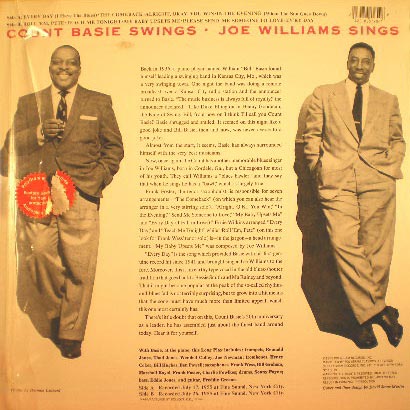I was never much into the blues because–although I recognized it was the forefather of jazz and rock’n’roll, and that, rooted in slave songs, it had this ingenious function of taking misery and flipping it into light commiseration–it struck me as overly macho and formulaic.
When I was a kid an older jazz freak friend loaned me a disc by Joe Williams and it was okay, but at the time I preferred Miles Davis and John Coltrane to most vocal jazz. Then a few years ago I found ‘Count Basie Swings, Joe Williams Sings!’
It’s a collection of blues songs…but Williams’ masterful interpretations are backed by the searing hot jazz of Basie’s big band. Although it’s hard to imagine now, this pairing must have been a modern, daring concept in 1958 akin to the idea of a hard techno remix of an R&B song in the mid-90s.
The master tapes for the stellar first side of the LP went missing, so the first four tracks on the CD version had to be salvaged from the original vinyl master. The pops and clicks of vinyl only add to the nostalgic quality.
It’s difficult to explain just how masterful Joe is as a singer, because it’s hard to separate his god-given vocal capabilities and his own inventiveness. He’s a baritone with a crazy low range, but he’s also effortless and clear in his high falsetto…with a quirky sibilance on top (his pronunciation of the consonant ‘s’).
All good singers have a command of their tone, resonance and breathiness at a given moment, but he seems to have full command of the degree of raspiness he introduces, and the lilting effect that happens when people go up into their falsetto mid-syllable…both things that tend to be happy accidents for other singers.
Often he’ll change the swing of his delivery on a dime, leaving the band playing ‘straight’ behind him while, after establishing the rhythm of the song, he suddenly swings his vocal in a new, unexpected way. And sometimes he’ll change it again before the song is through. I don’t think I’ve heard this done in quite this way before or since Joe Williams. On this record he’s got personality to spare…in the way he pronounces the word ‘love,’ for example on ‘The Comeback,’ when he sings ‘girl you know I looohhhhhhve you’…and his ad libbed ‘do not you feel mighty lonesome’ (as opposed to ‘don’t you feel mighty lonesome’) on ‘In The Evening’. The man is just cool.
But the piece-de-resistance in his bag of tricks is his ridiculous lung capacity. I love it when he shows off at the end of both ‘In The Evening’ and ‘Every Day I Have The Blues’ by holding notes long enough for you to make a five-course meal, eat it and wash the dishes.
Though it’s unthinkable these days, each of these recordings were made in one continuous take. Since these musicians cut their chops playing live for decades, I’m sure it was natural to get a take that was close to perfection after a few tries. But it seems like Joe had a knack for taking any vocal imperfections that surfaced while the red record light was on and riffing on them, playing with them to make them into an asset of that particular performance. Again, it all seems within his control, so no one will ever know what moments were accidents.
Joe appeared on a few episodes of the Cosby Show as Claire Huxtable’s father. Before he died, in ’99, a journalist friend of mine met him at a club in NY in ’99, and I’m told that Joe had one hell of a high opinion of himself. Modesty and humility are attractive qualities, but I hate to say it: I agree with Joe’s on this one.

